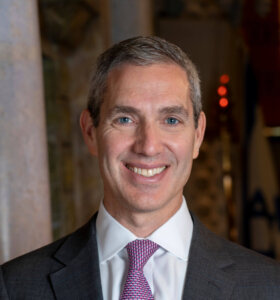When a Scholar Became Chancellor
| Who is Arnold Eisen? | Few of my colleagues in the Conservative rabbinate have ever met this Stanford University professor, who was named last month to replace Ismar Schorsch as chancellor of the Jewish Theological Seminary of America. The appointment is sure to shape the character of the premier American institution of Jewish studies and the Conservative movement itself, helping set the priorities of American Jewish life in our century. |
Yet we clergy and Conservative lay leaders alike have met the choice with a combination of curiosity, surprise, anger and disappointment. When I passed out a one-page text for a study session over Passover, a congregant glanced at it and muttered, “I see you are teaching the collected writings of Dr. Eisen on Conservative Judaism.”
At a time when the Conservative movement is in search of direction — with divisive issues like gay ordination and same-sex marriage on the docket, when JTS itself faces an estimated debt of $30 million, when the character of American Judaism overall is undergoing radical transformations — there is a call to the bullpen for the ace to get the team out of this mess and here comes… Eisen, an ivory-tower dweller from across the continent, far from a “movement man,” not even a rabbi!
Sure, Eisen’s academic credentials are impeccable; he is perhaps the premier thinker on the condition of North American Jewry. And I understand that Eisen is active in his Conservative synagogue in Palo Alto; people who know him say he is a true mensch in shul and out.
But like the Israelites of old, we can hardly help asking of Eisen, “Who made you chief and ruler over us?”
The answer may lie in the realization that this is not the first time the Conservative movement has felt the urge to ask the question. A century ago, a similar reception greeted the crowning of none other than Solomon Schechter to the same exalted chancellor’s throne.
Having arrived in England in 1884, Schechter became the best-known scholar of rabbinics in his day, famous for salvaging a treasure trove of documents called the “Cairo Genizah.” But he and his wife Mathilde lived a rather isolated Jewish existence in Cambridge, further troubled by ongoing financial dependence on the charity of others.
At that time, JTS, ideologically rudderless after the deaths of Sabato Morais and Joseph Blumenthal, was in desperate need of reorganization. Financially, it was kept alive only by borrowing money against itself.
American Judaism, too, was undergoing a transformation. Eastern European Jews who had poured into the country beginning in the 1880s sought to express Judaism in their new context: geographically, linguistically and culturally. Simply put, JTS had to bring in a leader with the academic credentials and gravitas to wow the public, the traditional learning and faith to be taken seriously by the Eastern Europeans, and the chutzpah to sell his vision of Jewish life both to American Jewry and the philanthropic community needed to support a fledgling movement.
And so, in an event dubbed “The Coup of ’02” by intellectual historian Mel Scult, a group of the most powerful Jews of the time conspired to do away with the old seminary and create a new one, with Schechter at the helm. The choice reflected the anti-clerical bias of the new seminary; despite his ordination, Schechter was first and foremost a professor, brought in from across the ocean, unencumbered by the “meddling of rabbis.”
Schechter’s charge was to create an American rabbinate to serve the flood of arriving immigrants. He assembled an extraordinary list of scholars at JTS in the short tenure before his untimely death in 1913. In those few years he founded the United Synagogue of America and witnessed the growth of the Rabbinical Assembly, which along with the reorganized seminary would carry on his labors into our own time. The force of his imposing personality established an ideological beachhead for Conservative Judaism here in America.
An outsider is recruited by a powerful board. A leader not of clerical cloth is designated, to the surprise of even the most entrenched players in the movement. The argument is put forth that only such an outsider can objectively diagnose the problems of the movement and make it swallow whatever bitter pills are necessary in order to move forward in health and vigor.
That was then — but is it now?
Schechter’s primary challenge was how to make America speak to the immigrant Jew. Eisen’s task is how to make Judaism speak to the assimilated American.
Schechter had to conceptualize a brand of critical scholarship compatible with traditional faith commitments. Eisen has to craft a brand of traditional Jewish learning for American Jews with secular educations far exceeding that of any previous generation.
Schechter operated during a time when Jewish identity was a distinctive marker defined for you by those around you. Eisen has rightly identified our moment as one when American Jews believe faith to be personal, private and a matter of individual concern.
For Schechter, the State of Israel was a dream; for Eisen, the State of Israel is a geo-political reality whose relationship with American Jewry is in desperate need of understanding and attention.
Schechter built up JTS, the United Synagogue and the Rabbinical Assembly because those institutions reflected the needs of American Jewry at the time. Eisen must imagine the institutions to fortify American Judaism for the future.
The task of the seminary’s search committee, both then and now, was to find the person best positioned to address the condition of American Jewry, someone who carries the academic bona fides to shape an academic institution and is enough of an outsider not to get caught up in internecine politics. That is just what the seminary did — in 1902 and now again in 2006.
Elliot Cosgrove, a Conservative rabbi at Anshe Emet Synagogue in Chicago, is pursuing a Ph.D. in modern Jewish thought at the University of Chicago.
























